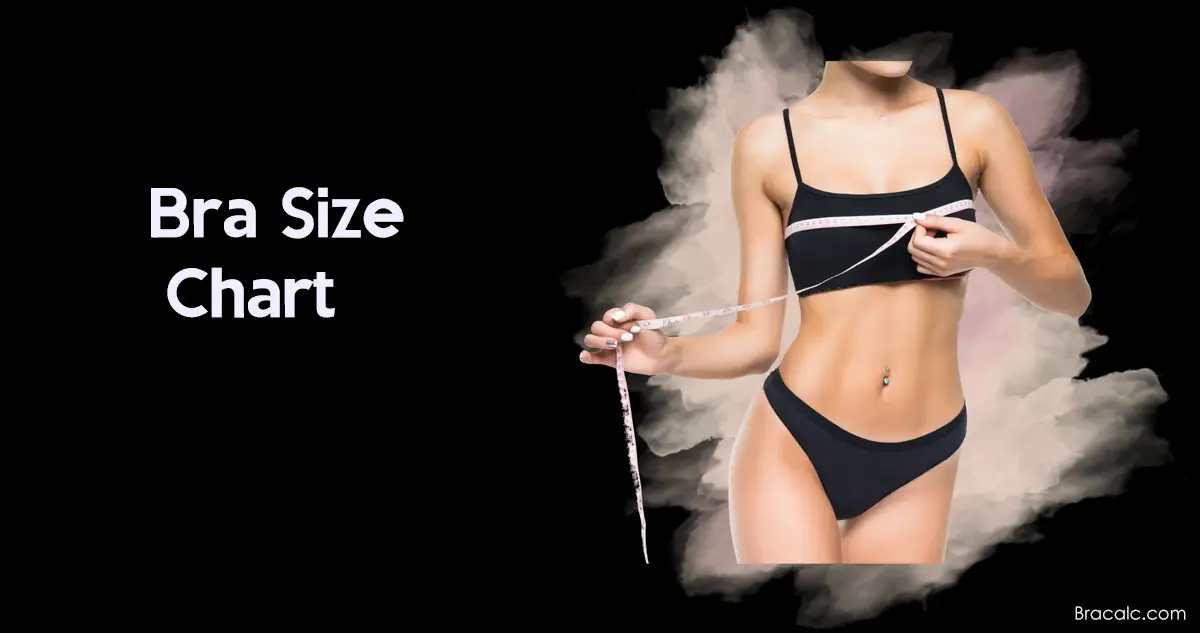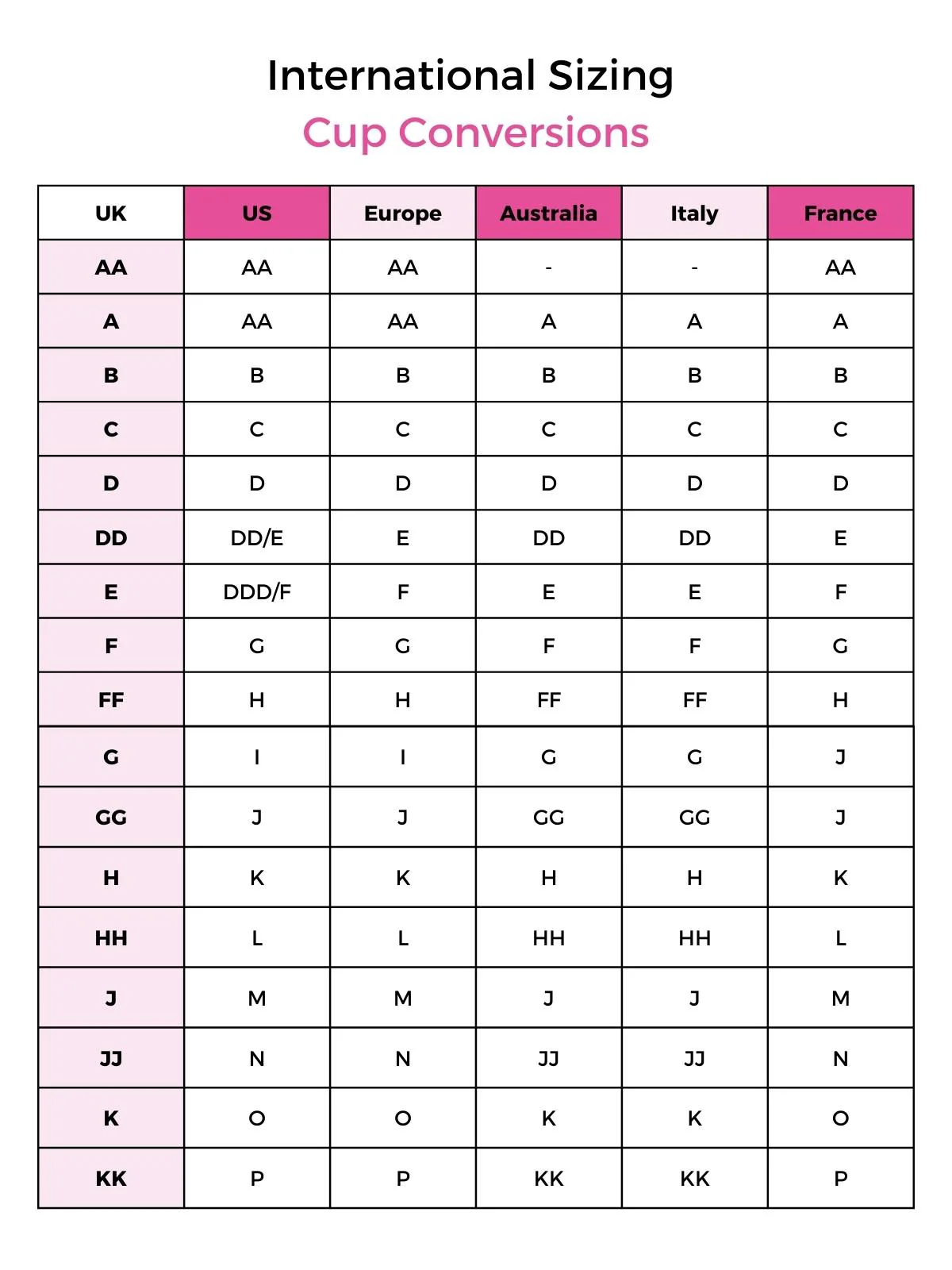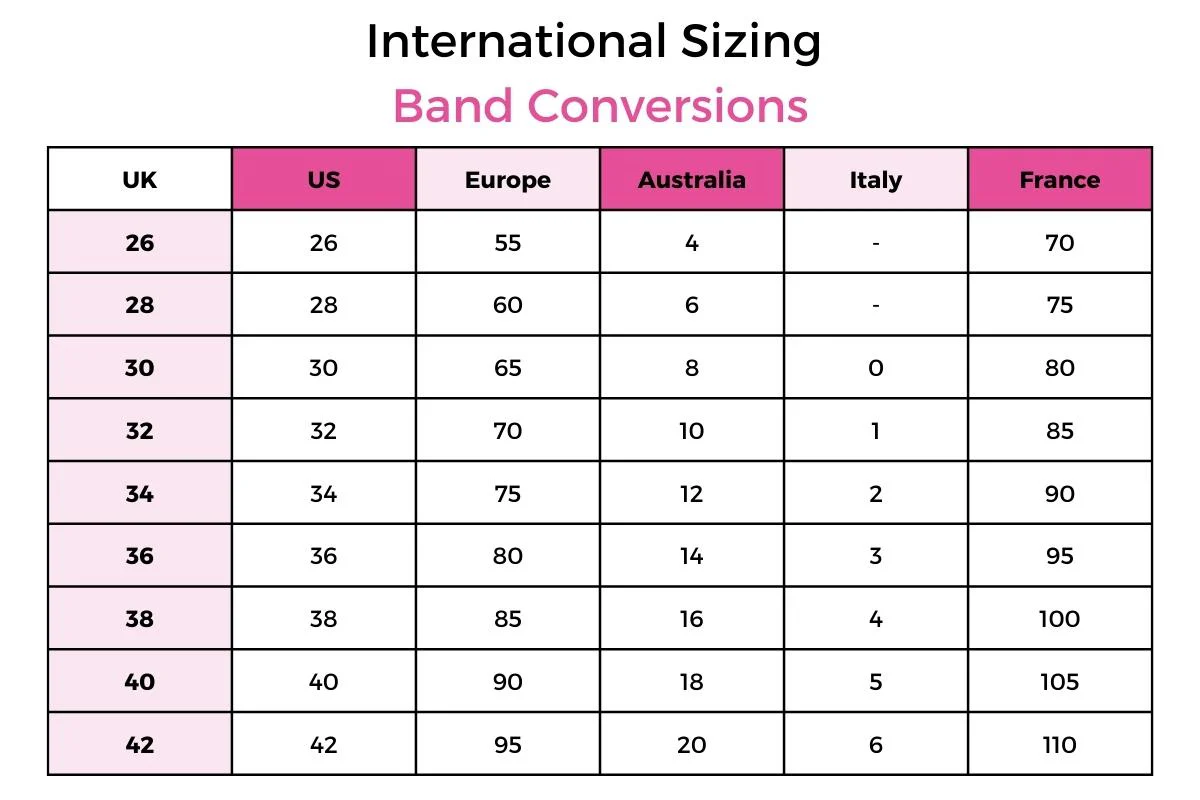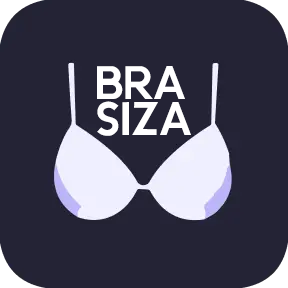Bra Size Chart | Measure Your Bra Size
Finding the perfect bra can be challenging, but it doesn’t have to be. Are you unsure about how to determine your correct bra size? Or maybe you’re confused by the different sizing systems used in different countries? Whether you’re shopping in the U.S., U.K., or Europe, this guide will help you understand how to measure yourself, convert sizes, and find the perfect fit.
What is a Bra Size?
A bra size chart typically consists of two components: the band size and the cup size. These measurements help you find a bra that fits comfortably and provides the support you need. Your band size refers to the measurement around your rib cage, just under your bust, while your cup size is determined by the difference between your band measurement and your bust measurement.

How to Measure Your Bra Size at Home
Before you start shopping for bras, it’s important to know your correct size. Here’s a step-by-step guide on how to measure your bra size:
- Band Measurement:
Use a soft measuring tape to measure around your rib cage, just below your bust. Make sure the tape is snug but not tight. This is your band size. If the measurement is an even number, add 4 inches; if it’s odd, add 5 inches. For example, if your ribcage measures 30 inches, your band size is 34. - Bust Measurement:
Measure around the fullest part of your bust while standing straight. Keep the tape comfortably firm but not tight. Make sure the tape stays level around your back. Round this number to the nearest inch. - Determine Your Cup Size:
To find your cup size, subtract your band measurement from your bust measurement. Each inch difference corresponds to a cup size:- 1 inch = A cup
- 2 inches = B cup
- 3 inches = C cup
- 4 inches = D cup
- And so on…
For example, if your band size is 34 inches and your bust measurement is 37 inches, the difference is 3 inches, so your cup size is a C. Therefore, your bra size would be 34C.
Bra Size Chart
Here is a quick reference Bra Size Chart to help you convert your measurements across different sizing systems:
Bra Size Chart for the U.S.
BAND MEASUREMENT | |||||||||
|---|---|---|---|---|---|---|---|---|---|
| <26″ | 26-28″ | 28-30″ | 30-32″ | 32-34″ | 34-36″ | 36-38″ | 38-40″ | ||
| BUST MEASUREMENT | 26″ | 26AA | |||||||
| 27″ | 26A | ||||||||
| 28″ | 26B | 28AA | |||||||
| 29″ | 26C | 28A | |||||||
| 30″ | 26D | 28B | 30AA | ||||||
| 31″ | 26DD | 28C | 30A | ||||||
| 32″ | 26DDD | 28D | 30B | 32AA | |||||
| 33″ | 26F | 28DD | 30C | 32A | |||||
| 34″ | 26G | 28DDD | 30D | 32B | 34AA | ||||
| 35″ | 26H | 28F | 30DD | 32C | 34A | ||||
| 36″ | 26I | 28G | 30DDD | 32D | 34B | 36AA | |||
| 37″ | 26J | 28H | 30F | 32DD | 34C | 36A | |||
| 38″ | 26K | 28I | 30G | 32DDD | 34D | 36B | 38AA | ||
| 39″ | 26L | 28J | 30H | 32F | 34DD | 36C | 38A | ||
| 40″ | 26M | 28K | 30I | 32G | 34DDD | 36D | 38B | 40AA | |
| 41″ | 26N | 28L | 30J | 32H | 34F | 36DD | 38C | 40A | |
| 42″ | 26O | 28M | 30K | 32I | 34G | 36DDD | 38D | 40B | |
| 43″ | 28N | 30L | 32J | 34H | 36F | 38DD | 40C | ||
| 44″ | 28O | 30M | 32K | 34I | 36G | 38DDD | 40D | ||
| 45″ | 30N | 32L | 34J | 36H | 38F | 40DD | |||
| 46″ | 30O | 32M | 34K | 36I | 38G | 40DDD | |||
| 47″ | 32N | 34L | 36J | 38H | 40F | ||||
| 48″ | 32O | 34M | 36K | 38I | 40G | ||||
| 49″ | 34N | 36L | 38J | 40H | |||||
| 50″ | 34O | 36M | 38K | 40I | |||||
| 51″ | 36N | 38L | 40J | ||||||
| 52″ | 36O | 38M | 40K | ||||||
| 53″ | 38N | 40L | |||||||
| 54″ | 38O | 40M | |||||||
| 55″ | 40N | ||||||||
| 56″ | 40O | ||||||||
Bra Size Chart for the U.K
| BAND MEASUREMENT | |||||||||
|---|---|---|---|---|---|---|---|---|---|
| <26″ | 26-28″ | 28-30″ | 30-32″ | 32-34″ | 34-36″ | 36-38″ | 38-40″ | ||
| BUST MEASUREMENT | 26″ | 26AA | |||||||
| 27″ | 26A | ||||||||
| 28″ | 26B | 28AA | |||||||
| 29″ | 26C | 28A | |||||||
| 30″ | 26D | 28B | 30AA | ||||||
| 31″ | 26DD | 28C | 30A | ||||||
| 32″ | 26DDD | 28D | 30B | 32AA | |||||
| 33″ | 26F | 28DD | 30C | 32A | |||||
| 34″ | 26G | 28DDD | 30D | 32B | 34AA | ||||
| 35″ | 26H | 28F | 30DD | 32C | 34A | ||||
| 36″ | 26I | 28G | 30DDD | 32D | 34B | 36AA | |||
| 37″ | 26J | 28H | 30F | 32DD | 34C | 36A | |||
| 38″ | 26K | 28I | 30G | 32DDD | 34D | 36B | 38AA | ||
| 39″ | 26L | 28J | 30H | 32F | 34DD | 36C | 38A | ||
| 40″ | 26M | 28K | 30I | 32G | 34DDD | 36D | 38B | 40AA | |
| 41″ | 26N | 28L | 30J | 32H | 34F | 36DD | 38C | 40A | |
| 42″ | 26O | 28M | 30K | 32I | 34G | 36DDD | 38D | 40B | |
| 43″ | 28N | 30L | 32J | 34H | 36F | 38DD | 40C | ||
| 44″ | 28O | 30M | 32K | 34I | 36G | 38DDD | 40D | ||
| 45″ | 30N | 32L | 34J | 36H | 38F | 40DD | |||
| 46″ | 30O | 32M | 34K | 36I | 38G | 40DDD | |||
| 47″ | 32N | 34L | 36J | 38H | 40F | ||||
| 48″ | 32O | 34M | 36K | 38I | 40G | ||||
| 49″ | 34N | 36L | 38J | 40H | |||||
| 50″ | 34O | 36M | 38K | 40I | |||||
| 51″ | 36N | 38L | 40J | ||||||
| 52″ | 36O | 38M | 40K | ||||||
| 53″ | 38N | 40L | |||||||
| 54″ | 38O | 40M | |||||||
| 55″ | 40N | ||||||||
| 56″ | 40O | ||||||||
EU Bra Size Conversion
| EU Size | UK Size | US Size | Band Size (CM) |
|---|---|---|---|
| 70B | 32B | 34B | 70 |
| 75C | 34C | 36C | 75 |
| 80D | 36D | 38D | 80 |
| 85E | 38E | 40DD | 85 |
Remember, EU sizes are based on centimeters, and they may appear differently than U.S. or U.K. sizes, but this bra size chart makes it easy to convert.
Bra Cup Size Chart

Bra Band Size Chart

What is XL in Bra Size?
If you’re looking for XL size bras, the sizing system might vary based on the brand. Some brands use a letter sizing system like XS, S, M, L, and XL for bralettes. Here’s an example of how XL could translate:
| Size | Band Size | Cup Size |
|---|---|---|
| XL | 34DD, 36D, 38C | D, DD |
What Does 32B, 34C, 36D Mean?
These numbers and letters are the standard ways to refer to a bra size. The number refers to the band size (the measurement around your rib cage), and the letter refers to the cup size (the volume of the breast). For example:
- 32B: Band size 32 inches, cup size B
- 34C: Band size 34 inches, cup size C
- 36D: Band size 36 inches, cup size D
Using a bra size chart can help you understand how these numbers and letters work together.
How Do I Know My European Bra Size?
In European sizing, the band size is measured in centimeters, unlike the U.S. and U.K. systems which use inches. For example, if your band size is 30 inches, it would convert to a 75 in European sizes (since 30 inches is about 75 cm). To find your European size, simply match your measurements using the EU to UK bra size chart.
How to Convert Between U.S., U.K., and EU Bra Sizes
Converting your bra size between different countries can be tricky, but with the right chart, it’s easy. Here’s a quick guide for converting:
- From U.S. to U.K.: The band size stays the same, but the cup size may differ slightly.
- From U.K. to EU: EU band sizes are measured in centimeters, so you may need to adjust accordingly.
- From U.S. to EU: Use a conversion chart for band and cup sizes.
Example Conversion:
- U.S. Size 34C = U.K. Size 34C = EU Size 75C
Refer to the bra size chart for accurate conversions.
Bra Fitting Tips
While having your correct size is crucial, how a bra fits is equally important. Here are a few tips to ensure a proper fit:
- The Band Should Be Snug:
The band provides most of the support, so it should fit snugly around your rib cage. It should be level all the way around your body and not ride up in the back. - The Straps Shouldn’t Dig In:
Your straps should feel secure but not tight. If they leave marks on your shoulders, the band might be too loose, or you might need a different size. - The Cups Shouldn’t Overflow:
The cups should fully encase your breasts without any spillage or gaping. If you see gaps, try a smaller cup size; if you have overflow, try a larger cup size. - Check for Comfort:
Comfort is key! You shouldn’t feel any discomfort or pinching. If the bra doesn’t feel right after wearing it for a few minutes, it’s not the right size.
Types of Bra Sizes and Styles
Different bra types provide different levels of support and shaping. Here are some common types:
- T-shirt Bras: These are lightly padded and have seamless cups, perfect for under fitted clothing.
- Sports Bras: Designed for high-impact activities, these bras provide extra support to keep you comfortable during exercise.
- Strapless Bras: These bras stay in place without shoulder straps, ideal for dresses and tops without straps.
- Bralettes: These are generally unpadded and come in more relaxed, comfy fits.
- Push-up Bras: These bras enhance cleavage with extra padding, great for adding volume.
What If I Can’t Find My Size?
Finding the perfect fit isn’t always easy, especially if you’re between sizes or if certain styles don’t fit like others. Here’s what you can do:
- Try Different Brands: Sizes can vary between brands, so don’t be afraid to try different ones.
- Get a Professional Fitting: Many stores offer professional fittings, which can help you find the best size and style for your body.
A bra size chart is a great tool, but don’t hesitate to reach out to professionals if you’re still unsure.
Final Thoughts
Knowing your bra size and understanding how it translates across different sizing systems can make bra shopping a lot easier. Whether you’re in the U.S., U.K., or Europe, this guide should help you feel confident in finding the best fit. Remember, comfort and support are key when selecting a bra, so always choose what feels right for you.
By using this bra size chart and following the fitting tips, you’ll be able to find a bra that fits perfectly, feels comfortable, and boosts your confidence. Happy shopping!
